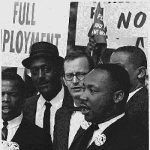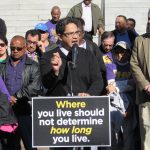In 1966, Dr. Martin Luther King ad-libbed a line in a speech in Chicago to the Medical Committee for Human Rights, saying, “Of all the forms of inequality, injustice in health care is the most shocking and inhumane.”
Almost 50 years later, as attention increasingly turns toward shrinking the gap in disease rates and life expectancy between those lowest on the socioeconomic ladder and those on the top rungs, King’s words are cited more frequently. They’re repeated to show how this towering public figure saw health care as a civil right, as much as voting or equality in education.
Sometimes, though, King’s words are slightly misquoted. It’s a small change, but I’ve twice seen the word “care” dropped, with the quote simply stating, “Of all the forms of inequality, injustice in health is the most shocking and inhumane” (underline added). It’s a small but very significant change, in that the latter implies King was speaking of health disparities from all known causes, such as low social status, poor educational attainment, lack of social cohesion, unemployment and underemployment, or living in substandard housing in crime-ridden areas.
While he’d certainly agree that health inequities are an anathema, in citing health care King was in fact only addressing a limited spectrum of what creates gaps in life expectancy as wide as 20 years between nearby U.S. neighborhoods. Not as much was known then about the multiple social sources of poor health, and how sick neighborhoods create sickness. And he was speaking of the appalling racism that black patients faced in hospitals and clinics.
Still, on average only 15 to 20 percent of the disparities in illnesses and death among U.S. populations are connected to access to health care, according to a 2008 article in the Journal of the American Medical Association. Genetics accounts for another 15 to 20 percent of life expectancy.
The rest has to do with how you live your life, and – critically – the kinds of resources you have available to live well. That’s the real focus of the health disparities movements, creating healthier neighborhoods, homes, schools and workplaces so people can thrive. Certainly adding more clinics and health care practitioners is part of the equation, but they can only go so far toward preventing illness and promoting health. And that’s why more activists are taking on health disparities linked to where you live and play.
As for background on Dr. King’s 1966 speech, this Huffington Post article shows the dogged work a civil rights lawyer did to verify that King actually spoke those words, since there’s no written record.
Suzanne Bohan
January 20, 2014 – MLK Day


